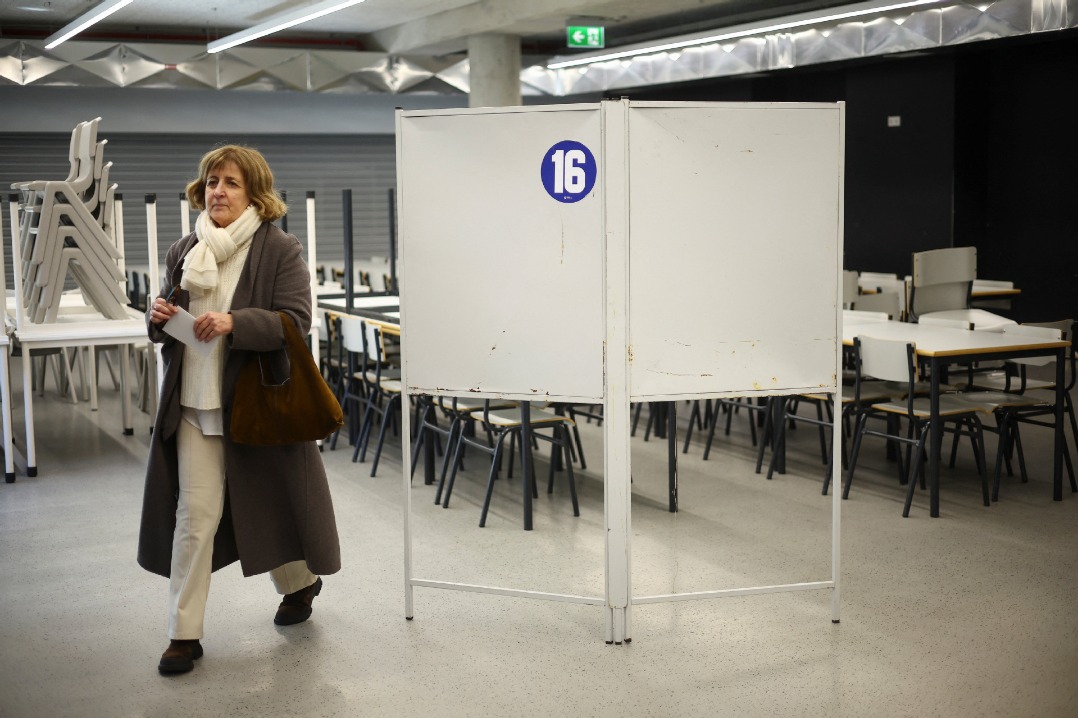EU's business environment dims: Report


Despite challenges, Chinese firms still keen to cultivate market within bloc
Chinese companies' evaluation of the European Union's business environment has dimmed for the fourth consecutive year because of the bloc's so-called de-risking strategy and its policy measures targeting Chinese investors, a report by the China Chamber of Commerce to the EU says.
The report, published on Tuesday, warned the EU not to politicize critical business matters, particularly in key areas such as information and communication technology, electric vehicles and renewable energy, clearly referring to an anti-subsidy investigation of Chinese EVs initiated by the European Commission recently and its earlier description of the Chinese telecommunications company Huawei as a "high-risk vendor".
About 43 percent of 180 Chinese companies surveyed said they felt the business environment for Chinese companies in the EU has deteriorated over the past year. The EU business environment for Chinese companies was given a score of 64 this year, compared with 65, 68, 70 and 73 for each of the years from 2019 to 2022.
Declining scores were reported in areas such as politics, economics, the environment, industry, human resources, business services and research.
Nevertheless, Chinese companies expressed willingness to cultivate the European market, according to the survey, conducted between July and October.
About 90 percent of the companies surveyed reported revenue increases; the corresponding figure in last year's survey was 70 percent. About 80 percent of the companies said they plan to raise their investment in the EU, something that the report said signifies "their long-term dedication to the EU market".
The report, titled Building Trust, Boosting Prosperity, called for collaboration and for both sides to capitalize on the positive momentum of resuming exchanges at all levels this year. Several senior European Commission officials have visited China in recent months. This year's China-EU Summit will be held in Beijing from Dec 7 to 8, the European Council announced on Monday.
The report stressed the importance of boosting mutual trust to address global challenges including geopolitics, climate change and energy and food security.
"For Chinese businesses, the European market is pivotal, serving as a key investment destination," said Xu Chen, chairman of the China Chamber of Commerce to the EU. "Their establishment of R&D and data centers, cybersecurity hubs and battery plants in countries such as Germany and Hungary contributes to local economies, job creation and innovation for sustainable growth.
"Our shared future is brighter when we (prepare) for more collaboration, communication and understanding of each other."
Concerns voiced
Speaking at the ninth Europe Forum in Brussels on Tuesday, Fu Cong, head of the Chinese Mission to the EU, voiced his deep concern regarding the EU's crackdown on Chinese technology companies on the pretext of national security and an anti-subsidy investigation of Chinese EVs and possibly Chinese wind turbines, photovoltaic parts and steel and aluminum products, as reported by the media.
Many of the measures are "protectionist in nature and potentially in conflict with WTO rules", he said, and that such "perceived departure of the EU from a world leader of free trade has sent shock waves through the Chinese business community".
"We are deeply concerned about the EU's growing assertiveness and unilateral actions as they have caused disruptions to our bilateral trade and investment."
The chamber report set out 170 detailed proposals and recommendations. They include calls for fair and transparent incentive policies between China and the EU to support global, green and sustainable development as well as calls for the EU carefully to handle any antisubsidy investigation relating to Chinese EVs.
The report stresses the need for China and the EU to promote collaboration in the digital industry, fostering mutual benefits and opposing trade barriers on the pretext of network security.
"We hope that the suggestions we put forward in the report will serve as a constructive reference to facilitate communication and win-win cooperation between China and the EU," said Li Bing, partner of the global consultancy Roland Berger.

































